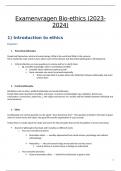Examenvragen Bio-ethics (2023-
2024)
1) Introduction to ethics
Explain:
1. Theoretical philosophy
People ask themselves: what are human beings, What is the world and What is the universe.
Since modernity exact sciences have taken much of this domain, but theoretical philosophy is still important.
Critical reflection on many questions in science and try to clarify them
o Eg: scientific knowledge: when is something scientific?
Scientific when sufficient empirical proof?
Some concepts may never be proved empirically
Those concepts float in a place where the distinction between philosophy and exact
science blurs
2. Practical philosophy
Disciplines such as ethics, political philosophy and social philosophy
People think about questions of politics and power, structures and ideologies (eg: capitalism, democracy,
colonization, communism, patriarchy…), the origins and essence of a society and the relation between individual and
social structure.
3. Ethics
In philosophy one central question can be asked: “how should one live?”. This question is linked to the basis of good
and evil, moral norms and values, the good life and the organization of a just society.
Today ethics is mostly about the study and search for the principles that are the foundation of norms and values
Branch of philosophy that deals with morality on different levels
o Two non-normative branches
Descriptive ethics → morality approached from social science, psychology and cultural
anthropology
Metaethics → why are human beings moral and how are they moral
Look at history of social science or biology to understand
o Two normative branches
General normative ethics → which kind of behavior is good or bad
1
, Applied ethics → questions asked in specific contexts
Specific moral dilemmas from specific subdomains of human action are analysed and
specified
Reflection on morality, with many dimensions associated with types of moral reflection and moral theories
4. Thought experiment
A thought experiment is a hypothetical situation in which a hypothesis, theory, or principle is laid out for the purpose
of thinking through its consequences.
Fictional cases with which one tries to test or bring to the fore certain philosophical intuitions
Seem far-fetched, but they help us solve dilemmas closer to home
Modern physics often started from thought experiments
5. Experimental philosophy
Questioning the function of thought experiments and the philosophical intuitions they are thought to invoke →
Demonstration that philosophical intuitions can differ between cultures
Values and thoughts that have forms the gist of Western philosophy may be less universal than previously
thought
6. Morality
The principles concerning the distinction between right and wrong or good and bad behavior.
A social institution with a history of its own and a code of rules and principles based on a fundamental notion of
good and evil
acquired through education, habit and culture and by which people’s acts and judgements are guided →
collective given
7. Egoistic prudence
Only a few people and lots of food and other resources at the beginning of human history, but as populations grew,
people had to compete for those resources
→ individuals entangled in bitter struggle to survive
Only the strongest made it
o Social contract emerged: it was in everyone’s advantage to keep to a set of moral rules and norms
→ Those rules and norms were institutionalized in laws and enforced by state
2
, 8. Ethical naturalism
Morally good can be discovered by looking at scientific data
Underlying idea: moral facts can be reduced to non-moral facts
→ moral facts have no separate ontological status in reality
o Necessary to look at empirical data to understand the concepts of moral goodness
9. Ethical non-naturalism
The good cannot be reduced to other non-moral facts
Goodness is a fundamental, separate characteristic that cannot be directly deduced from natural facts
→ properties of goodness cannot be defined, but can only be shown
o Goodness is what our moral intuitions point to, not what we can imply from empirical data
Situate bioethics within the broader field of philosophy and in relation to other disciplines
Bioethics is a branch of applied ethics that focuses on ethical issues arising from advances in biology and
medicine.
o Sits within the broader field of philosophy, which is concerned with fundamental questions about
the nature of reality, knowledge, ethics, and human existence.
Philosophy can be further divided into various subfields, such as metaphysics, epistemology,
ethics, logic, and aesthetics, among others.
Within philosophy, bioethics draws on various ethical theories and approaches to address ethical issues
related to healthcare, biotechnology, and medical research.
o Some of the key ethical theories that inform bioethics include utilitarianism, deontology, virtue
ethics, care ethics, and feminist ethics.
o Bioethics also draws on other philosophical subfields such as philosophy of science, philosophy of
technology, and political philosophy.
Bioethics is also interdisciplinary, and it draws on insights from other disciplines such as medicine, biology,
psychology, sociology, anthropology, law, and public health.
o For instance, medical ethics is a subfield of bioethics that focuses specifically on ethical issues arising
in clinical practice and medical research.
Similarly, neuroethics is a subfield that focuses on ethical issues related to advances in
neuroscience and the brain.
3




